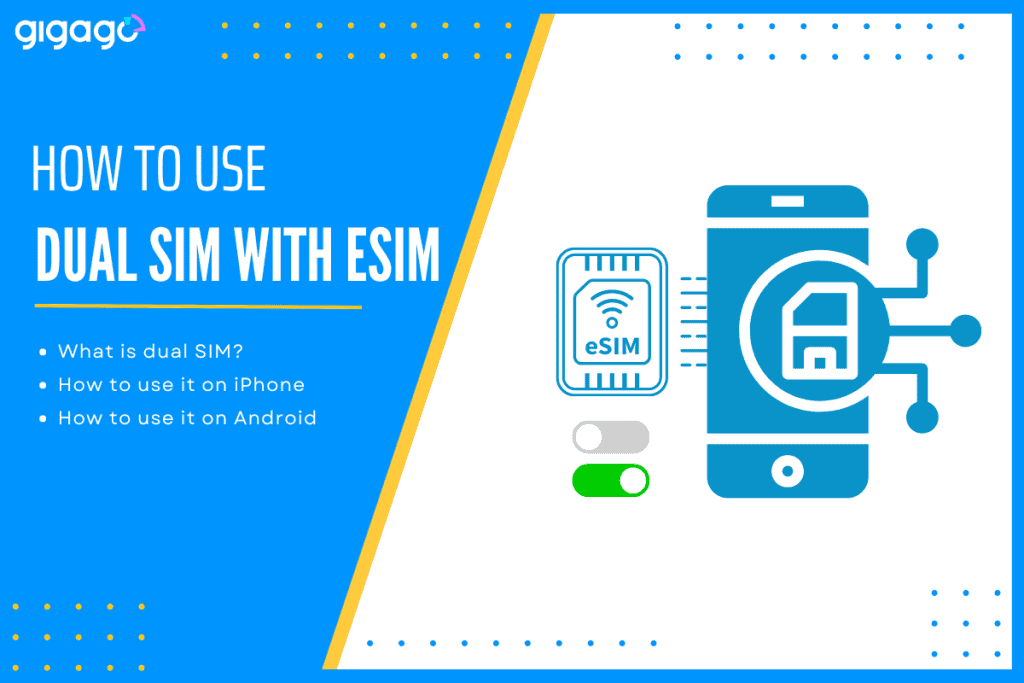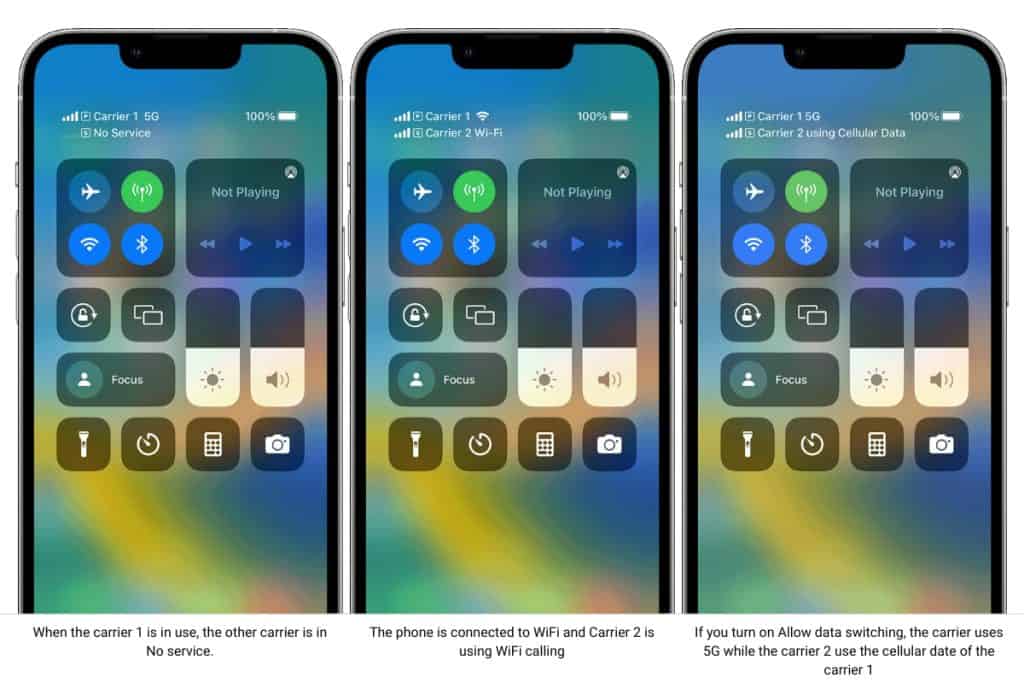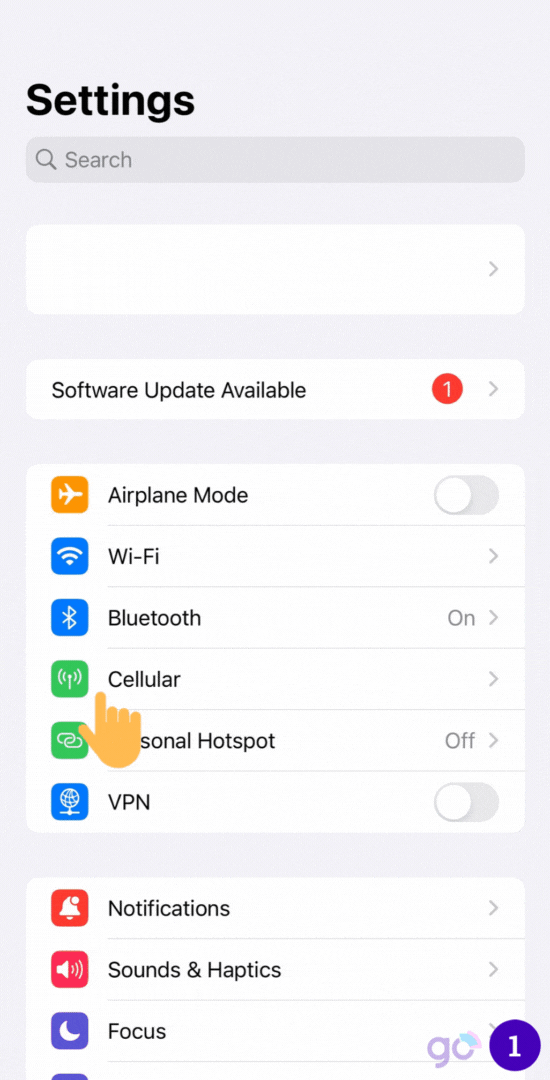When you shop for a travel eSIM or glance at your phone’s status bar, you will often see your phone show network types like “LTE”, “4G”, or sometimes even “5G”. Most people just assume it means “fast internet” and move on – which is fair enough, but there’s a bit more to it than that. […]
What is Dual SIM? How to Use Dual SIM with an eSIM
Find out what is dual SIM and whether or not you can use an eSIM and a regular SIM at the same time. Then, learn how to use dual SIM with an eSIM.

You can use an eSIM and a regular SIM at the same time. This technology is called dual SIM. Dual SIM technology allows you to maintain two separate lines on one device. You can download your eSIM profile after purchasing, set it up and connect it right away to a local network while traveling without having to remove your primary SIM card.
In this tutorial, we will show you the ins and outs of dual SIM, dual SIM phones, and how to use dual SIM with an eSIM effectively on iPhone and Android devices.
In this article
I. What is Dual SIM?
Dual SIM (dual Subscriber identity module) is a feature that allows a smartphone to operate with two SIMs and/other eSIMs simultaneously.
A dual SIM phone with an eSIM allows you to use a regular SIM and eSIM at the same time, often one for personal use and one for other purposes.
This is useful for travel. You can keep your regular SIM card active for calls and messages, while adding a local or international eSIM for cheaper data and calls in the destination country. It reduces the risk of losing your primary SIM and allows you to maintain contacts on your primary SIM card while you travel.
Dual SIM status icons
The icons in the status bar at the top of your phone screen show the signal strength of your network carriers.
Below are the images of the dual SIM status icons on iPhone.

The image 1: When the carrier 1 is in use, the other carrier is in No service.
The image 2: The phone is connected to WiFi and Carrier 2 is using WiFi calling
The image 3: If you turn on Allow data switching, the carrier uses 5G while the carrier 2 use the cellular date of the carrier 1.
Different types of Dual-SIM modes
There are three dual-SIM modes:
- Dual SIM standby (DSS)
- Dual-SIM Active (DSA)
- Dual SIM Dual Standby (DSDS)
Let’s see our comparison table between these three types of dual SIM:
| Criteria | Dual SIM standby (DSS) | Dual-SIM Active (DSA) | Dual SIM Dual Standby (DSDS) |
| Availability | Older phones | Less common, found on higher-end dual SIM phones | Widely available on most current dual SIM phones |
| Call Handling | – Use two SIM cards but only one can be activate for calls at a time- Switching between SIMs requires ending the current call | – Both SIMs can be used for active, simultaneous calls- Both lines are active permanently – Can switch between calls on two lines | Both SIMs can receive calls simultaneously, but only one can be used for an active call. |
| Data usage | – Data can only be used on the active SIM at a time- Switching between SIMs will interrupt data connection | Data can be used independently on each SIM at the same time | Data can be used independently on each SIM at the same time |
| Text messages | Text messages can be received on both SIMs, but can only be sent from the active SIM | Text messages can be sent and receive independently on each SIM | Text messages can be sent and received independently on each SIM. |
| SIM management | Users can manually switch between SIMs or set a preferred SIM for different functions. | Users can set preferred SIMs for voice calls, messaging, data etc. | Users can set preferred SIMs for voice calls, messaging, data etc. |
| Battery Consumption | Lower battery drain as only one SIM is active at a time. | Highest battery drain as both SIMs are actively in use. | Higher battery drain as both SIMs are in standby mode. |
Most current smartphones use Dual SIM Dual Standby (DSDS) technology, meaning that both SIMs can make and receive calls.
II. How Does a Dual SIM Phone Work?
Dual SIM phones have either two physical SIM slots or one physical and one virtual (embedded SIM). Each SIM card operates independently. Newer phones use the nano/eSIM combination.
III. Benefits of using Dual SIM with an eSIM
With dual SIM, you can:
- Use a local data plan when traveling
- Keep two separated lines, one for personal and the other for work/travel
- Use one plan to send/receive calls and text messages and the other to use cellular data.
- Free to choose your network
- Enjoy greater network coverage
IV. How to Use Dual SIM with an eSIM
Using dual SIM with an eSIM is easy and straightforward. Let’s see how you can use a regular SIM and eSIM at the same time for travel on iPhone and Android devices.
1. Label your SIM plans
Labeling your SIM plans will help you identify and manage them easily. If you are going to travel, then you can set your physical SIM (pSIM) works as a primary SIM and eSIM as your secondary SIM.
Here is how to label your eSIM plan on iOS:
- Go to Settings on your iPhone
- Select Cellular/Mobile data
- Select your eSIM plan (which is usually “Secondary” line)
- Enter the label you want and save

Here is how to label your eSIM plan on Android:
- Go to Settings on your phone
- Select Network & Internet/Connections
- Select SIM card > eSIM plan
- Enter the label you want and save
After labeling, you can configure your eSIM plan with the new label as default line for voice/text, mobile data, etc. Labels are changeable.
2. Turn on a line with an eSIM
On a dual phone with an eSIM, you can choose to activate an eSIM to connect to a supported network in your destination country.
Here is how to turn on your eSIM line on iOS:
- Go to Settings on your phone
- Select Cellular/Mobile > eSIM
- Switch on Turn on This Line
- Switch on Data roaming
- Select Network Selection and select a supported network (you can find a list of networks in the Additional Information field of your eSIM)
How to do it on Android:
- Go to Settings on your phone
- Select Network & Internet / Connections
- Select Mobile network > switch on eSIM
- Switch on Mobile Data and Data Roaming
- Choose a support mobile network in the Additional Information field of your eSIM
3. Set default line for voice/text and cellular data
Next, to use dual SIM with an eSIM, you need to set up your default line for voice/text, cellular data, etc. If your eSIM is data-only, you will want to use it as a mobile data consumption and the pSIM for voice and text.
Here is how to set default line for SIM/eSIM on iOS:
- Go to Settings > Cellular / Mobile data.
- Select Default voice line > select your SIM line
- Select Cellular data > Select your eSIM line
Here is how to set default line on Android:
- Go to Settings > Network & Internet / Connections
- Select SIM card
- Select Calls > select your pSIM line
- Select Texts > select your pSIM line
- Select Data Service Network > select your eSIM line
V. How to Switch Between a pSIM and an eSIM
You can switch back and forth between a physical SIM and eSIM if necessary. It often happens when you return to your home country and want to use your regular SIM for calls/texts and mobile data.
Here is how to switch between an eSIM and a physical SIM on iOS:
- Go to Settings on your phone
- Select Cellular / Mobile
- Select eSIM line and toggle it off
Here is how to do it on Android:
- Go to Settings
- Select Connections or Network and internet
- Select Mobile network > toggle off the eSIM
When you travel to another country, you can buy a new eSIM plan and set it up. Then you can follow the same steps as above.
VI. Which Phones Support Dual SIM?
Most modern smartphones today are equipped with dual SIM capabilities although there could be some differences in how the dual SIM is supported.
Today dual SIM phones support one physical SIM and another eSIM; or in some cases, simply two eSIMs. You can see this technology in iPhones (from iPhone XR onwards) and Pixel phones (from Pixel 3a onwards).
On Samsung phones, dual SIM is traditionally supported with the use of two physical SIM cards. For Samsung phones that are eSIM-compatible, dual SIM can be supported with the use of one physical SIM and one eSIM. This technology is seen from Samsung Galaxy S20 series and later, and other Samsung models. Check this full list of eSIM-compatible devices.
Note: If you want to use 5G with Dual SIM on iPhone 12, 12 mini, 12 Pro, or 12 Pro max, you need to have iOS 14.5 or later.
VII. Can Dual SIM phones use different networks?
Yes, but to use different network carriers, your iPhone must be unlocked. Otherwise, both of two lines must be from the same carrier. If your phone is locked, please contact the network provider to ask them to unlock it. Phones bought on a contract are often locked while phones bought directly from manufacturers are usually unlocked.





